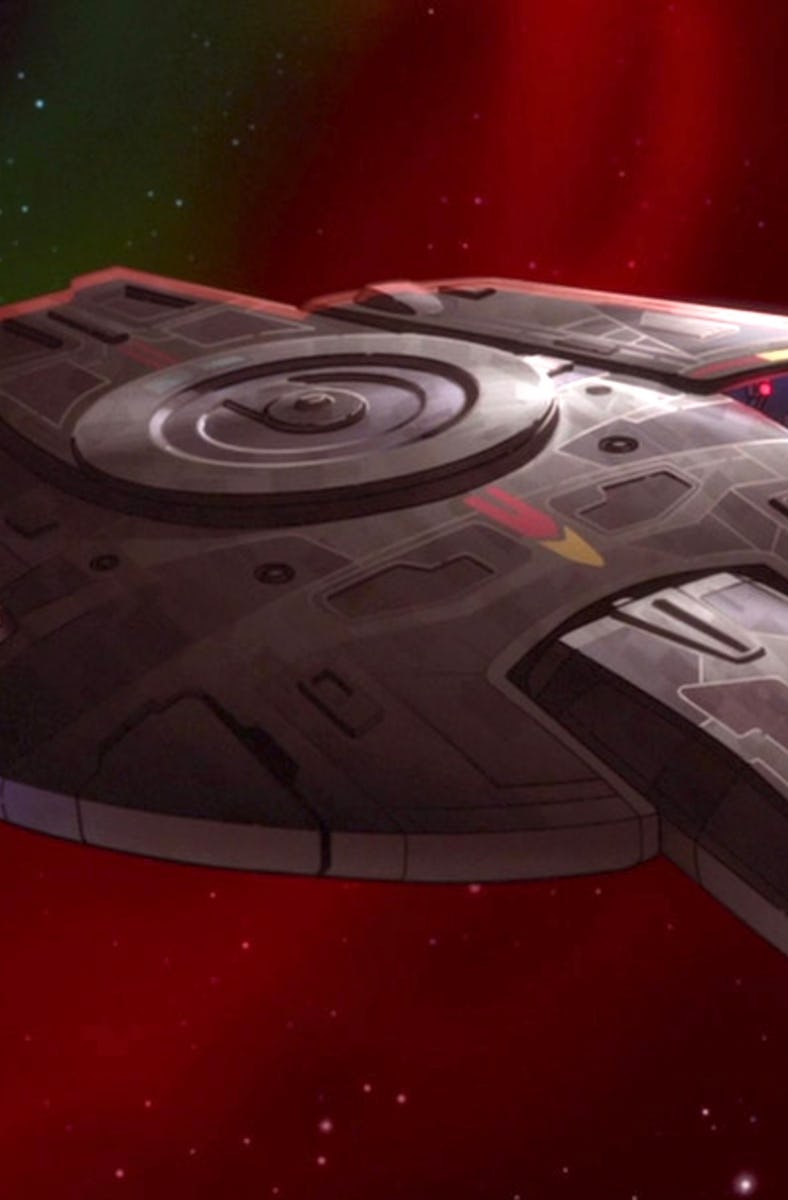Star Trek’s Massive Multiverse Epic Just Put Marvel To Shame
It’s a shipload full of Starfleet variants!

While the animated series Star Trek: Lower Decks is know for its overt comedy — which has included a fair share of dirty jokes and swear words — this show still takes place in the real-deal Star Trek canon, and as such, is, at its core a serious Star Trek show. Now, with its penultimate episode, “Fissure Quest,” Lower Decks has done something no other Trek series has ever accomplished: casually drop a crossover episode consisting of various legacy characters, albeit all from alternate universes. But this episode isn’t just a one-off joke. In “Fissure Quest,” we learn that a crew of what can only be called Star Trek “variants” are out there trying to stop the multiverse from collapsing in on itself.
Somehow, this episode is the best Trek episode about parallel universe ever, contains lavish fan service, and also, by mocking its own basic conceit, puts other contemporary multiverse shenanigans like the MCU to shame.
Spoilers ahead.
Boimler, Curzon Dax, T’Pol and Mariner in a massive multiverse crossover.
Although “Fissure Quest” begins with a brief prologue set in the Prime Universe, it mostly follows a top-secret mission aboard the starship Anaximander, a Defiant-class ship that is commanded by “William” Boimler, the transporter duplicate of Brad Boimler from the Season 2 episode “Kayshon, His Eyes Open.” Back in Season 3, in a kind of post-credits moment in the episode “Crisis Point 2: Paradoxus,” it was revealed that although presumed deceased, this Boimler duplicate had been recruited by Section 31. Essentially, “Fissure Quest” picks up from that point. Boimler is now in command of the Anaximander, traveling through various Quantum Realties, trying to figure out why one rogue ship is creating fissures between universes.
Boimler’s crew is essentially a massive Easter egg basket of Trek legends: an alternate, older version of T’Pol from Enterprise; a version of Curzon Dax from Deep Space Nine, who did not transfer is symbiont to Jadzia; and a holographic version of Dr. Bashir, also from DS9, who is married to a Starfleet version of Garak. (This last bit fulfills a decades-long desire from fans to see these two characters as a couple.) And, as previously teased in a trailer, much of the Anaximander’s support crew is comprised of various duplicates of Harry Kim (from Star Trek Voyager), all from slightly different dimensions.
Jolene Blalock, T’Pol from Enterprise, attending “Star Trek Day” in 2021.
Like Marvel’s What If? all of these characters are voiced by the people who played the character in live-action, which means Star Trek has casually just brought back Alexander Siddig (Bashir), Andrew Robinson (Garak), Jolene Blalock (T’Pol), and Garrett Wang (Harry) all in one episode. In the case of Robison and Siddig, it’s been 25 years since they’ve played these characters in a new Star Trek series. For Wang, its been 23 years since Harry last appeared in Voyager, and for Blalock, it’s been 19 years since the end of Enterprise. Each of these cameos, just on their own, are all very big deals for Star Trek fans. And by the middle of the episode, we even get an appearance from Alfre Woodard as Lily Sloane, who first appeared in the 1996 smash-hit Star Trek: First Contact.
But smartly, this fan service isn’t just fan service for the sake of it. Throughout the episode, we’re reminded that although this is Boimler’s transporter duplicate, he is still very much our Boimler. And when he recruits an alternate Mariner from a dimension in which she’s an engineer, it’s made clear that the character is, essentially, the same person, even though she’s in a gold uniform and has a slightly different skill set.
Bashir and Garak return in Lower Decks.
At the beginning of the episode, Boimler is frustrated by the endless remix of familiar tropes saying, “I’m so sick of the f*cking multiverse.” And yet, when the Anaximander learns that the rips in the multiverse have been caused on accident by an alternate version of Starfleet that is exploring different realities, Boimler realizes that the multiverse can be more than just a cheap plot device that creates endless cameos.
By not making a big deal of its epic crossover crew, Lower Decks does what other modern multiverse crossovers sometimes forget to do — make the novelty of alternate timelines into a story about something relatable. Alternate dimensions and paths not taken can make for gripping and thrilling juxtapositions. But what Lower Decks dares to ask is simple: What if, he existence of the multiverse isn’t just for neat crossovers? What if, instead, we could learn more about ourselves by seeing things from a slightly different point of view?